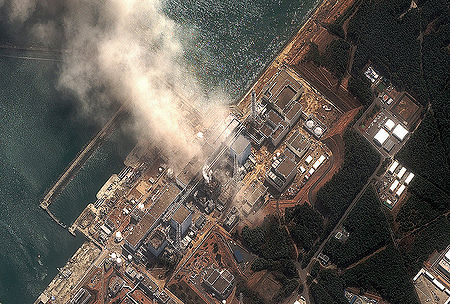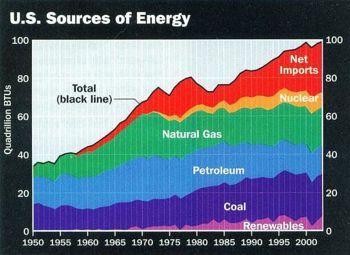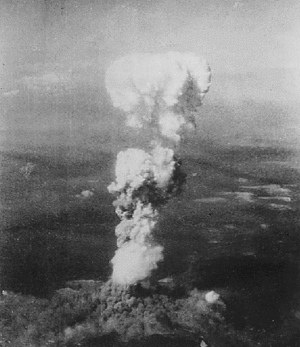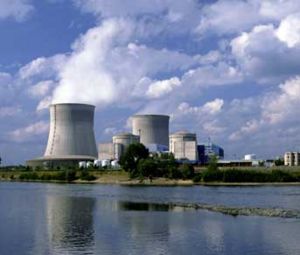Nuclear Energy
 From Conservapedia
From Conservapedia Nuclear energy is the energy released by atomic nuclei, as in nuclear fission or fusion.[1] Commonly the heat produced is harnessed by steam turbines to produce electricity in nuclear power plants.
The main uses of nuclear technology is in nuclear reactors, which use the energy in an atom to create power, or nuclear weapons, which use the energy in warfare. There are two types of reactions, nuclear fission and nuclear fusion. France is the nation with the greatest reliance on nuclear energy for electric generation.
In roughly 30 years or more, only two nuclear power plants have been activated in the United States, due to opposition by Leftist environmentalists. Both of these nuclear power plants are located in Tennessee under the unique Tennessee Valley Authority, and the second one was the result of a 43-year effort.[2]
Contents
Theory[edit]
Contrary to a popular liberal misconception, nuclear energy has nothing to do with the fanciful hypothesis of E=mc². (In natural units, this equation would be simplified to E=m.) Under this hypothesis, this formula is the energy contained in an atom. This energy is released in a nuclear weapon when a speeding neutron collides with the atom, blasting it apart, and releasing the binding energy of the atom. In a nuclear weapon, the atom blasted apart then releases other neutrons which collide with other atoms. This keeps occurring until there are no atoms left to destroy. This is known as a nuclear chain reaction. In a nuclear fission power plant, however, the nuclear core is designed so that a runaway chain reaction cannot occur, by limiting the number of neutrons available to continue the reaction by the use of control rods.[3]
Nuclear fusion, on the other hand, is based on putting atoms together, as opposed to breaking them apart in fission, heavier atoms often require less bonding energy than the combined original binding energies of the fusing lighter atoms.
Weapon[edit]
A nuclear weapon is a weapon designed with a nuclear warhead. Nuclear weapons not only produce mass devastation in the blast radius, but also create a nuclear fallout for many years to come. Recently, there has been much fear of a terrorist state or organization getting hold of either a Soviet weapon or creating one of their own.
Nuclear fission based weapons occur by the nuclear chain reaction system, while thermonuclear weapons create nuclear fusion in their reaction.
Power[edit]
Nuclear fission has existed for power over fifty years, starting with the Manhattan Project. It currently supplies electricity to many of the nations of the world. The nuclear industry was booming in the 1960s and 1970s, but political opposition stopped nuclear construction in the USA. There is talk of renewing construction because it is the cleanest and cheapest source of large quantities of power, it doesn't depend on Mideast oil, and it doesn't emit greenhouse gases.
Nuclear fusion has been sought vigorously as a clean energy source, but the end result in every try has been less energy resulting in the reaction than was put into it. Nevertheless, several countries still invest heavily in nuclear fusion energy programs in the hope that someday they may become viable.
Many man-made satellites rely upon nuclear energy to power their electric systems.
Controversy[edit]
An environmentalist's ideal energy is one that emits no greenhouse gasses and is efficient. Nuclear energy is not only competitive with coal energy, but by an environmentalist standards, "cleaner." Environmentalists claim that they want the cleanest, most efficient energy source, but despise domestic nuclear energy use while at the same time ardently support Iran obtaining nuclear energy. This negates any validity they had towards nuclear energy being unsafe. H.R. 391 [4] would amend the Clean Air Act of 1963 [5] to not allow congress to regulate greenhouse gas emissions. This would make the energy industry more competitive. As all free market economists know, the product of competition is lower prices at better quality, ultimately benefiting the American people the most.
Recently, many liberal American politicians have renewed their efforts to scale back nuclear power in the US; liberal pundits have similarly pushed for the elimination of nuclear power in the US despite the lack of greenhouse gas output from this power source. Several nations (e.g. Germany) have set down plans to entirely eliminate nuclear power in the coming decades. The argument has been put forth that the US and other countries should replace nuclear power production with presumably safer "renewable" power sources (i.e. wind and solar power); however, nuclear power is in general very safe and these alternative power sources fail to provide baseload power. Thus, the elimination of nuclear power, in addition to eliminating a clear power source, will likely cause massive problems in the electrical infrastructure of these countries and potentially the US if the current sentiment regarding nuclear power in the US does not change.

References[edit]
Categories: [Energy] [Physics]
↧ Download as ZWI file | Last modified: 03/06/2023 16:00:06 | 116 views
☰ Source: https://www.conservapedia.com/Nuclear_Energy | License: CC BY-SA 3.0
 ZWI signed:
ZWI signed:


 KSF
KSF